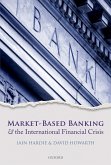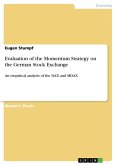Bachelor Thesis from the year 2012 in the subject Business economics - Banking, Stock Exchanges, Insurance, Accounting, grade: A, The University of Chicago, language: English, abstract: In 2008, the world witnessed economic turndown of the most dangerous nature since the Great Depression of the 1930s. It all began in 2007 when high home prices in the United States turned downward that spread quickly to the entire US financial sector and then to financial markets globally. The overall casualty in the United States included the biggest insurance company, the entire investment banking industry, the largest mortgage lender, two of the largest commercial banks and the largest savings and loan. The impact of downfall in the United States had a huge impact globally and specifically the European countries. The worst hit country by financial turn down was Greece (Salas et al, 2010). Greece even before joining the Euro was living beyond its means. After adopting single currency, public spending soared. Between 1999 and 2007, public wages increased by 50%, faster than most of the countries in Eurozone. The government also hosted 2004 Athens Olympics and piled up debt. The debt in Greece kept soaring till the point where the country was no longer able to repay its debts. Greece was forced to ask for help from the IMF and European parts in the form of massive loans (Shiller, 2008). This research analyzes the global financial crisis and its impacts on Greece. It analyzes the austerity measures taken up by Greece and its impacts on the country. The research analyzes the bail outs that were granted to Greece to save the country from defaulting. IMF, World Bank and European Central Bank helped Greece by providing loans along with strict austerity measures by the economy of Greece had continuously shrank and the situation is not getting any better. The aims and objectives of the research include: . Analyzing the current financial crisis in Greece . Analyzing if there is any opportunity present in Greece for economic revival . Proposing a plan for revival of Greece's economy For analyzing the financial situation of Greece, secondary data was used for extensive and in-depth analysis. The secondary research data sources included books, case studies, articles and literature review. With this methodology, the research investigated and analyzed the weaknesses and strengths of steps that were taken in Greece in order to counter the financial crisis. The analysis revealed that it was the poor taxation policies and economic structure that contributed to the worsening financial situation of Greece.
Dieser Download kann aus rechtlichen Gründen nur mit Rechnungsadresse in A, B, BG, CY, CZ, D, DK, EW, E, FIN, F, GR, HR, H, IRL, I, LT, L, LR, M, NL, PL, P, R, S, SLO, SK ausgeliefert werden.









